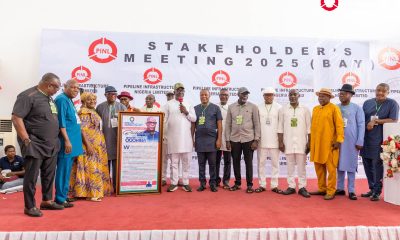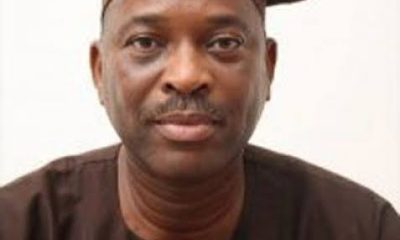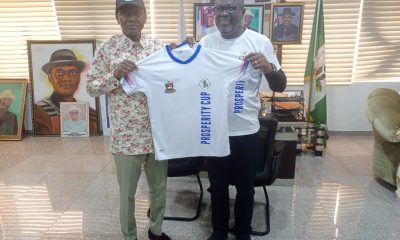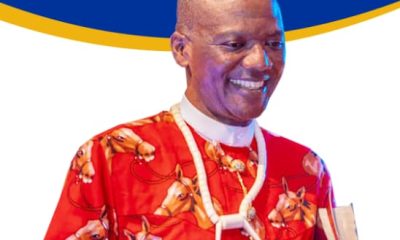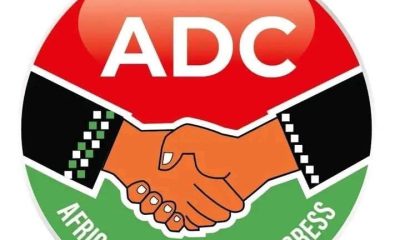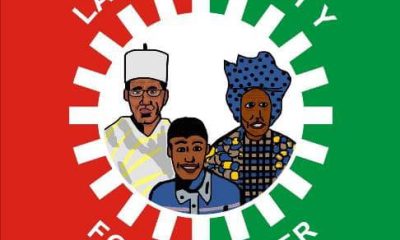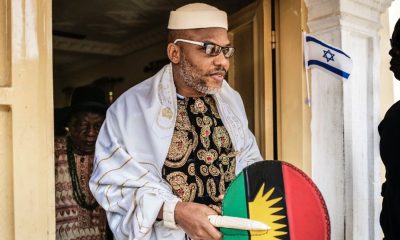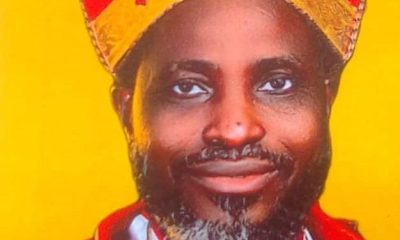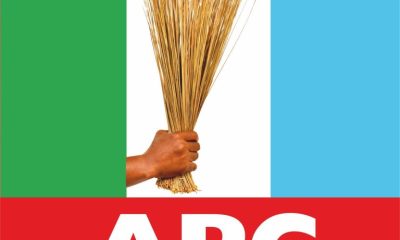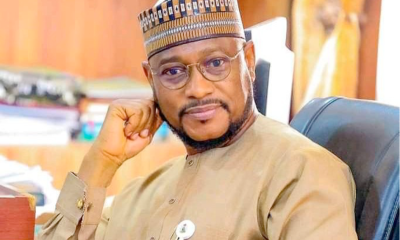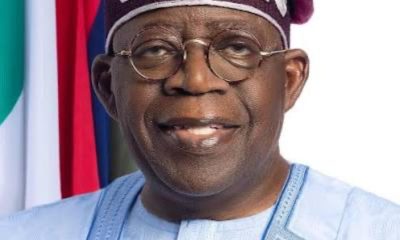Politics
10th Senate @1: Akpabio’s Leadership Pedigree as Senate President in Focus
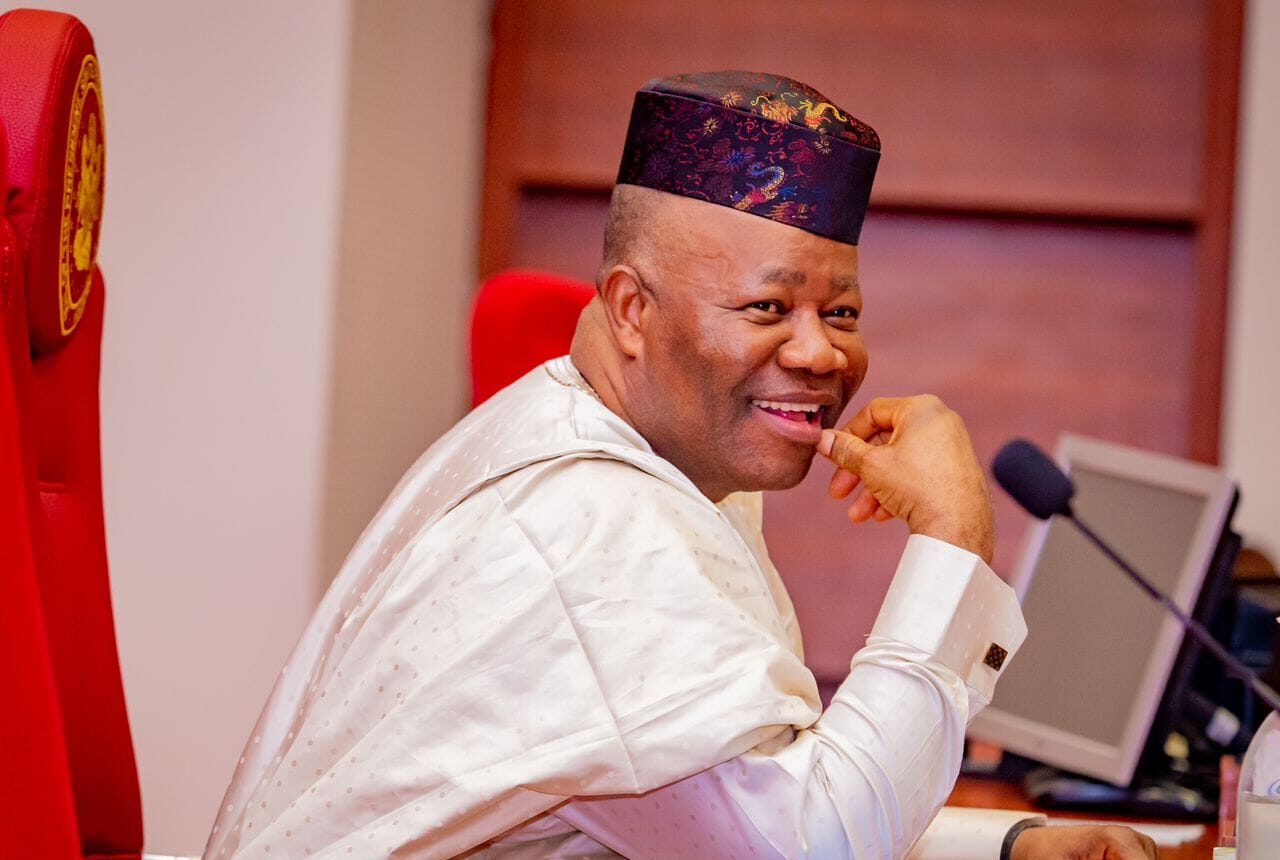
By Ola Awoniyi
Senator Godswill Obot Akpabio’s emergence as President of the 10th Senate on 13th June, 2023 raised high expectations. Not just because of his track record of high service delivery in his previous public offices, but also because Akpabio is not a stranger in the National Assembly, having been elected as the Minority Leader of the Senate in his first appearance in 2015. The Upper chamber is a familiar terrain for the Akwa Ibom North-West Senator.
However, for the Senate President, who is Chairman of the National Assembly, to meet the expectations, he needs unity and stability not just at the Upper Chamber but at the National Assembly. Akpabio’s election to the coveted seat was keenly contested. At the end of the contest, God’s will prevailed.
With the formal inauguration of the 10th Senate, the new Senate President’s first task was to unite the chamber following the divisions that inevitably arose from the leadership contest. In his inaugural address to his Distinguished colleague Senators shortly after being handed the gavel, Akpabio said: “I will continue to be one among you and I will work with you, for you, beside you. I will be a Senate President that will stand for all. I want to extend my hand of fellowship to you. I take it that every single senator voted for me. And what has happened here today is historic.”
With those soothing words, Akpabio gently signposted his leadership direction. With the full complements of its body of Principal Officers, the flight of the 10th Senate took off smoothly. However, the flight ran into a slight turbulence before reaching cruising level.
The first experience was when Adamawa Senator Elisha Abbo raised an alarm over the Constitution of the Senate Standing Committees. He alleged that his fellow northern Senators had been unfairly treated. And for this, he just stopped short of calling for the head of Akpabio. Abbo was actually not speaking for himself alone. He was the Secretary of the Northern Senators Forum. The truth is that all Senators cannot be expected to be satisfied with the allocation of the leadership positions of the Standing Committees. The exercise has always led to misgivings that had to be deftly managed by the Senate leadership.
Following the complaint, Akpabio, with his listening ears, tweaked the composition and even created more Committees to pacify some ranking Senators displeased with the original arrangement. He weathered the storm. At the end of the day, Senator Elisha Abbo, who spat fire in the newspapers in the morning, recanted on Television, with apologies, at sunset.
Senator Abdul Ahmed Ningi would later create a bigger controversy in March this year. Ningi alleged in an interview with BBC that the 2024 Budget was duplicated and padded to the tune of N3.7 trillion. That was a serious allegation. Ningi is a ranking Senator, who had held principal offices in the Senate. Besides, he was also the Chairman of the Northern Senators Forum. So his allegation could not be ignored.
In his usual way, Akpabio tabled the matter at a plenary session beamed live on Television. At the session, Senator Solomon Adeola Olamilekan, Chairman of the Appropriation Committee, gave a lucid explanation to what seemed unclear to Ningi in the budget. Olamilekan’s explanation should have been sufficient to douse the tension and settle the matter once and for all but Ningi remained defiant. This forced the Leader of the Senate, Michael Opeyemi Bamidele, to intervene and return fire for fire. Bamidele suspected brinkmanship by some opponents who had vowed to ensure that Akpabio was removed before his first anniversary as Senate President. Opeyemi described the unsubstantiated allegation of budget duplication as a “civilian coup” attempt against the leadership of the Senate which had been aborted.
The Ningi saga was another litmus test for Akpabio. But his leadership qualities and experience again came to the fore in the way the Senate transparently and effectively handled the matter. All through the session, Akpabio was calm and decisive in his interventions. Eventually, Ningi was suspended for three months for violations of legislative rules, misconduct and unethical behaviour in his BBC interview on the 2024 Budget. The suspension was lifted about two weeks before the expiration of the three months. This followed a motion moved on 28th May, 2024 (and with apologies, on Ningi’s behalf), by Senate Minority Leader, Abba Moro. Ningi eventually returned to his seat at the Senate Chamber on Tuesday, 4th June, 2024, without holding a grudge against anybody.
The 10th Senate under Akpabio has remained focused and resolute in the discharge of its constitutional roles and pursuit of its Legislative Agenda since its inauguration. For instance, it promptly screened the ministerial nominees of the President. Senators were scheduled to proceed on a short break when the list of the nominees was submitted but they deferred their holiday by more than one week to conclude the confirmation process. This they did in national interest.
While still screening the ministerial nominees, the Senate received an executive communication from President Bola Ahmed Tinubu with respect to the Economic Community of West African States (ECOWAS). It was about a political crisis in the Republic of Niger caused by the overthrow of the democratically elected government of that neighbouring country in a military coup on 26 July, 2023. This necessitated an extra-ordinary summit of the ECOWAS, chaired by Nigeria. Tinubu needed to inform the Senate about the far reaching and sensitive decisions taken by ECOWAS on the crisis. In a letter to the Senate, the President stated: “Following the unfortunate political situation in Niger Republic culminating in the overthrow of its President, ECOWAS under my leadership condemned the coup in its entirety and resolved to seek the return of the democratically elected government in a bid to restore peace.”
According to the letter, which the Senate President read in Plenary on 4th August, 2023, one of the options on ECOWAS’ table was the “deployment of personnel for military intervention to enforce compliance of the military Junta in Niger should they remain recalcitrant.” Under the Nigerian constitution, the President cannot deploy troops outside the borders without an approval of the Senate. Even though the Letter from the President did not expressly seek an approval of the Senate, not a few people believed that such request was implied in the letter as Nigeria keyed in to the plans outlined by the ECOWAS. Section 5(4)(b) of the Nigerian Constitution states: “Except with the prior approval of the Senate, no member of the Armed Forces of the Federation shall be deployed on combat duty outside Nigeria.”
A day after the letter was read, which was a Saturday, Akpabio led the Senate into an executive session. Rising from the closed door session, Akpabio announced, at Plenary, the Senate’s response to the Presidential communication. He said, among other things, that: “The Senate calls on the President of the Federal Republic of Nigeria and Chairman of ECOWAS to further encourage other leaders of ECOWAS to strengthen the political and diplomatic options and other means to resolve the political logjam in Niger Republic.” That was a tacit rejection of the military option contemplated by ECOWAS.
That golden advice by the Senate was a defining moment for Akpabio’s leadership. ECOWAS cannot deploy troops without Nigeria. So the response of the Nigerian Senate was widely acknowledged as instrumental to ECOWAS’ abandoning the military option and restricting itself to diplomatic solutions instead. Thus, the Senate decision averted a war of unpredictable implications for the sub-region and Nigeria.
On the international scene, Akpabio, in October 2023, led the Nigerian delegation to the 147th General Assembly of the Inter-Parliamentary Union(IPU) which held in Luanda, Angola. It was his first appearance at the meeting as the Senate President. At that meeting, he was elected into the Executive Committee of IPU. The last time Nigeria had that privilege was in 1964. That was a great feat and triumph of International diplomacy for Nigeria.
Similarly in March 2024, Akpabio was at the head of Nigeria’s delegation to the 148th Assembly of IPU in Geneva, Switzerland. At that meeting, he made Nigeria proud by his spectacular contribution with a passionate call on the warring parties in Gaza for a ceasefire. In April 2024 as well, the IPU nominated Akpabio as a member of the Preparatory Committee for the Sixth World Conference of Speakers of Parliament (2025). It was in pursuant in that role that he was invited to Geneva the following month for the first meeting of the Committee at IPU Headquarters.
Akpabio has applied his leadership acumen to engender stability in the red chamber, which has enabled the Distinguished Senators to focus on their statutory responsibilities. Bills and motions are being passed without distractions. Akpabio’s tenacity, constant and prompt interventions facilitated the completion of the renovation of the Senate Chamber which is now in use. The project was started in July 2022 during the tenure of the Ninth National Assembly but the contractors thrice reneged on completion dates before they eventually delivered in April 2024.
Also as Chairman of the National Assembly, Akpabio has smooth and robust working relationship with his counterpart in the green chamber, the Speaker of the House of Representatives, Rt. Hon. Tajudeen Abbas. This has, no doubt, manifested in a productive legislative business by the two Chambers in the past one year.
A year at the saddle, Akpabio has lived up to his reputation as a political leader and administrator of uncommon capabilities and has not disappointed the expectations of Nigerians.
***Awoniyi, Media Aide to Senate President, writes from Abuja
Politics
Prioritize welfare and security of Nierians not 2027 politics, LP Reps tell Tinubu, APC
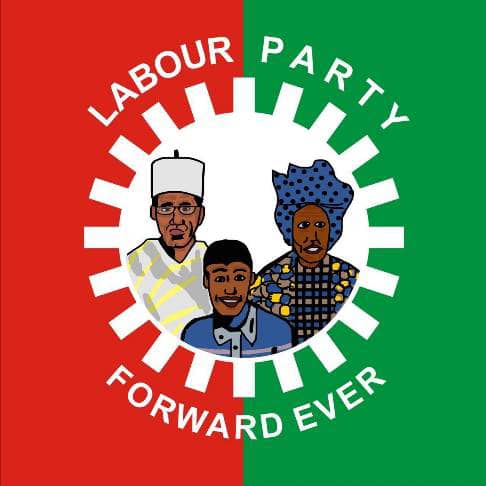
By Our Correspondent
The Labour Party Caucus in the House of Representatives has expressed disappointment and concern that the ruling All Progressives Congress (APC) is prioritizing 2027 politics over the welfare and security of Nigerians, labeling it insensitive, unconscionable and a clear example of questionable leadership.
They emphasized that while the President’s aspiration for re-election is legitimate, his priority should be addressing the pressing challenges facing Nigerians.
In a statement issued by the Labour Party Caucus Leader, Hon. Afam Victor Ogene, in Abuja on Sunday, the lawmakers reiterated that the primary duty of a government is to ensure the welfare and security of its citizens. However, they criticized the APC and President Bola Tinubu for prioritizing their 2027 reelection bid over these fundamental responsibilities. The statement expressed concern and bewilderment that while the nation grapples with insecurity, the ruling party is either ignoring the issue or offering superficial solutions rather than addressing the problem effectively.
These concerns were raised amid escalating insecurity nationwide and the administration’s struggles to fund budgets and demonstrate accountability. “The situation has led to prolonged protests by local contractors who remain unpaid for completed projects, sparking economic hardship, stalled development, and a dearth of new projects.”
Recently, these aggrieved contractors have been holding vigils outside the Ministry of Finance, highlighting the government’s shortcomings.
The Labour Party representatives highlighted that the “Appropriation Act, a law governing budget allocation, has been consistently disregarded by the current administration.” They pointed out the irony of the government pursuing costly projects like the controversial multi-trillion naira coastal road without proper appropriation or procurement processes, while essential federal road infrastructure lies in disrepair. This has raised concerns among citizens, particularly those planning to travel during the festive season, who face not only difficult road conditions but also heightened insecurity.
Also of grave concern is the opaque expenditure of N17.5 trillion, in 2024 alone, on a pipeline-security contract, as revealed in the recently audited accounts of the Nigerian National Petroleum Company, NNPC.
“Nigerians would remember that over a 12-year period, the country spent about N18 trillion on subsidy(which benefitted everyone through affordable transportation and cheaper costs of foodstuffs), but on the excuse of lack of funds to sustain the subsidy regime, this Administration has clearly robbed Peter(Nigerians), to pay Paul(cronies), through a questionable pipeline-security contract whose executors are unknown.”
This statement paints a grim picture of Nigeria’s current state, highlighting concerns about the effectiveness of its government branches. “The executive is seen as underwhelming, the judiciary’s decisions are questioned, and the legislature is criticized for not having the moral fiber to hold the executive accountable.
“Our dear country, Nigeria has become a special economic zone: everyone and everything now has a price. Kidnappers and bandits now have prices on the heads of the citizenry; elected officials now have a price to look the other way; and opposition figures have prices to enthrone chaos in their own platforms. Even the clergy and ulamas are not spared the chicanery of the divisive effects of a gravely monetized polity.
“Pray, Nigerians, we’re in the 12th month of the year, 2025. In fact, across government owned enterprises, ministries, departments, and agencies of government, none can boast of 10 percent of execution of the capital component of the budget. In most cases, the scorecard reads nil.
“Yet everyone carries on, as though this has become the new normal.
Worse is the glaring impunity of relevant officials not bothering to explain to anyone where revenues meant for the implementation of the budget have ‘disappeared’ to.
“Nigeria is on a negative cruise; local contractors occupying the offices of the Federal Ministry of Finance, retired police officers taking over the gates of the National Assembly, while kidnappers freely choose where to strike every single day, yet the only response by government is to launch and distribute vehicles for a purported Renewed Hope Agenda.
So, while the country sits on the precipice, all Mr. President thinks about is to return to power in 2027.
“Mr. President, while your quest is a legitimate aspiration, please do well to attend to the current stark realities confronting Nigerians.
Besides the parlous state of Nigerian roads – which now ensures that a hitherto six hours journey, from either Lagos or Abuja to the South South or South East, now takes an entire day to traverse – is the grim reality of possible kidnap which stares every road user in the face.
“Some lawmakers are reflecting on their roles and acknowledging that many are complicit, silenced by potential pecuniary gains. Many have described the 10th Assembly as the worst in Nigeria’s democratic history, reduced to puppetry and rubber-stamping, with no tangible benefits for citizens. They criticize the government for prioritizing economic interests over citizens’ welfare, labeling it “economic banditry.”
“We must not continue on this sorry path. Both the ruling party and opposition must put aside politics and prioritize the people’s welfare. Citizens are the backbone of democracy, and their interests should come above all else.”
Politics
Rivers Assembly Speaker, 16 others dump PDP for APC
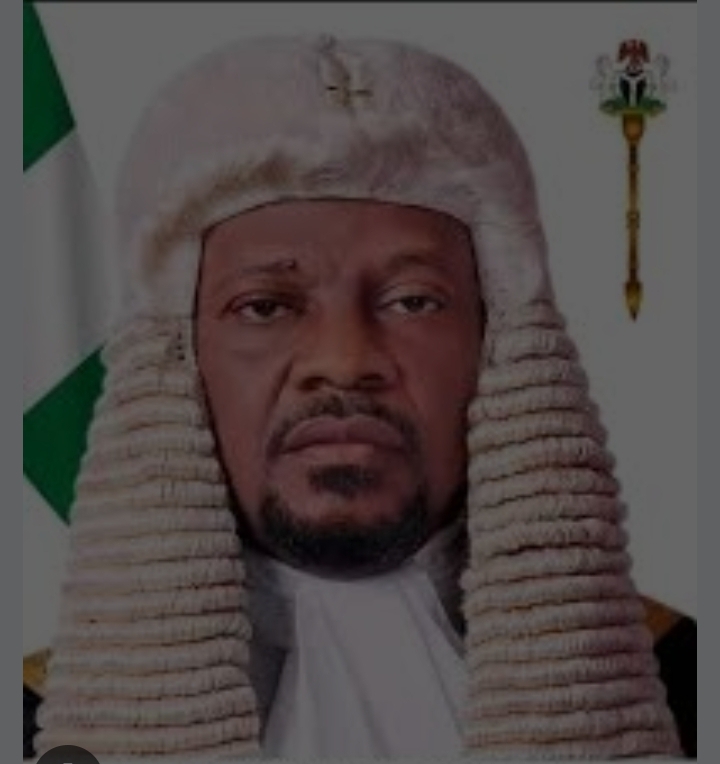
By Our Correspondent
Seventeen members of the 10th Rivers State House of Assembly, on Friday, defected from the Peoples Democratic Party (PDP) to the All Progressive Congress (APC).
The lawmakers announced their defection during plenary on Friday, December 5, 2025 at the Auditorium of the Assembly quarters currently used as the hallowed chambers.
The defected lawmakers, led by Speaker of the House, Martin Amaehwule, cited the division in the PDP at the national level as the reason for their defection, noting that the situation has made the future of the party “hazy and nebulous”.
Among the lawmakers who defected to the All Progressive Congress were; the Speaker, Martin Amaewhule, Deputy Speaker, Dumle Maol, Majority Leader, Major Jack, Deputy Majority Leader, Linda Somiari- Stewart, Chief Whip, Hon. Frankline Nwabuchi, and the Deputy Whip, Hon. Ofiks Kabang.
Others are; Hon. Peter Abbey, Smart Adoki, Igwe Aforji, Arnold Davids, Enemi George, Tekenari Granville, Christian Nwankwo, Gerald Oforji, Azeru Opara, Lolo Opuende, and Hon. Solomon Wami.
Recall that the Speaker, Martin Amaehwule had in December 2023, in the heat of the over two years political crisis in the state, led all 27 members of the Assembly loyal to the FCT Minister to the APC but later denied their defection, and returned to the PDP.
Meanwhile, the PDP which is now the minority party in the House with 9 members, has constituted their officers with Hon. Sylvanus Nwankwo emerging the Minority Leader, Hon. Barile Nwakoh was elected Deputy Minority Leader, Hon. John Dominic Iderima, Minority Whip, and Hon. Justina Emeji, Deputy Minority Whip.
The Assembly has also renewed its earlier call on the State Governor, Sir Siminalayi Fubara to forward his list of Commissioner-nominees to the House for screening and confirmation in line with the 1999 Constitution; regretting that “the State is yet to have the complement of a full cabinet.”
The Assembly also reaffirmed its earlier resolution made on the 14th of December, 2023, and adopted the auditorium at the State House of Assembly quarters as its legitimate and lawful Chamber for the conduct of legislative businesses for the life of the Tenth Assembly of the State.
Speaker of the Assembly, Martin Amaehwule in his speech lauded President Bola Tinubu for his purposeful and exceptional leadership and pledged their support to the APC and the President.
Politics
Sulu – Gambari , Ita Enang , Dambazzau , Ibas Ibok -Ete, 61 others make Tinubu’s Ambassadorial list
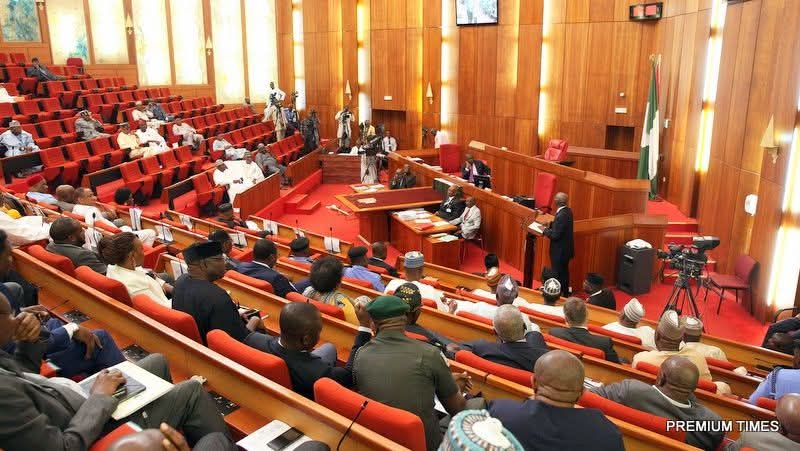
By George Mgbeleke
The Senate Thursday received requests for confirmation of nominations of 65 Ambassadorial nominees from President Bola Ahmed Tinubu.
The nominees as read from two different lists by the President of the Senate , Godswill Akpabio during plenary, fell into two categories of 34 Career Ambassadors and High Commissioners and 31 Non – Career Ambassadors and High Commissioners designate .
Notable names among the 34 Carrer Ambassadors and High Commissioners are Ambassador Sulu – Gambari Olatunji Ahmed from Kwara State , Ambassador Ahmed Mohammed Monguno from Borno State , Ambassador
Maimuna Ibrahim from Adamawa State etc .
Notable in the list of Non Career Ambassadors and High Commissioners are Senator Solomon Ita Enang from Akwa Ibom State , Vice Admiral Ibas Ibok – Ete from Cross River State , Ex Chief of Army Staff, Abdulrahaman Dambazzau from Kano etc .
President Tinubu in the requests hinged on section 171 sub section 1, 2 and 4 of the 1999 Constitution , sought for expeditious consideration of the nominees .
Accordingly, the President of the Senate, forwarded the requests to the committee on Foreign affairs for screening and report back within one week .
Recall that President Tinubu had earlier forwarded to the Senate , three ambassadorial nominees last week for appointment confirmation .
The three earlier nominees , namely
Kayode Are ( Ogun State), Aminu Dalhatu ( Jigawa) and Ayodele Oke ( Oyo State ), were screened on Wednesday by Senator Abubakar Sani Bello ( Niger North ) led committee .
Full list of the Ambassadorial nominees per state reads : ” Ambassador Ezenwa Chukwuemeka ( Abia ) Maimuna Ibrahim ( Adamawa ), Monica Ogochukwu ( Anambra) ,
Ambassador Mohammed Mahmoud Lele ( Bauchi) ,
Endoni Sindo ( Bayelsa) and Ambassador Ahmed Mohammed Minguno ( Borno ) .
Others are Jane Adams Okon Michael ( Cross River ), Clark Omeruo Alexandra ( Delta ), Chimma Geofrey Davies ( Ebonyi) ,
Oduma Yvonne Ehinose ( Edo State ), Wasa Segun Ige ( Edo State )
Ambassador Adeyemi Adebayo Emmanuel ( Ekiti ), Ambassador Onaga Ogechukwu Kingsley ( Enugu ) and
Magaji Umar ( Jigawa) .
Other nominees in the category of Career Ambassadors are
Mohammed Saidu Dahiru ( Kaduna ) ,
AbdulSalam Abus Zayat ( kano) ,
Shehu Barde ( Katsina ) , Aminu Nasiu ( Katsina ),
Abubakar Musa Musa ( Kebbi) ,Mohammed Idris ( Kebbi) ,
Bako Adamu Umar ( Kogi ) ,
Sulu Gambari Olatunji Ahmed ( Kwara ),
Ramata Mohammed ( Lagos ), Shaga John Shama ( Nasarawa )
Salau Hamza Mohammed ( Niger ) and Ibrahim Danlami ( Niger ) .
Others are
Adeola Ibrahim Mopelola ( Ogun) ,
Ruben Abimbola Samuel ( Ondo),
Akande Wahab Adekola ( Osun) ,
Adedokun Esther ( Oyo) ,
Gedagi Joseph John ( Plateau ) ,
Luther Obomode Ayokalata ( Rivers ),
Danladi Yakubu Yaku ( Taraba ) and
Bello Dogondaji ( ( Zamfara ) .
Names on the list of the 31 Non – career ambassadorial nominees are
Senator Grace Bent ( Adamawa ) , Senator Eta Enang ( Akwa – Ibom),
Nkechi Linda Okocha ( Anambra ),
Mahmud Yakubu ( Bauchi )
Philip K. Ikurusi ( Bayelsa ) ,
Paul Oga Adikwu ( Benue ),
Vice Admiral Ibok-Ette Ibas rtd ( Cross River ),
Hon. Abasi Braimah ( Edo ) and
Erelu Angela Adebayo Ekiti )
Others are Barrister Olumilua Oluwayimika Ayotunwa ( Ekiti ),
Rt. Hon. Ifeanyi Ugwuanyi ( Enugu State ) ,
Barr. Mrs. Chioma Ohakim ( Imo State ),
Lt. Gen. Abdulrahman Bello Dambazau (rtd.) ( Kano State ),
Hon. Tasiu Musa Maigari ( Katsina ) ,
Alhaji Abubakar Sanusi Aliyu ( Kogi) and
Olufemi Pedro ( Lagos State ) .
Others are
Barr. Mohammed Ubandoma Aliyu ( Nasarawa ),
Senator Jimoh Ibrahim ( Ondo), Ambassador Joseph Sola Iji ( Ondo ),
Fani-Kayode ( Osun ) , Professor O. Adewole ( Osun) , Florence Ajimobi ( Oyo ), Lola Akande ( Oyo), Professor Nora Ladi Daduut ( Plateau) , Yakubu N. Gambo ( Plateau ) , Chukwujinka Okocha ( Rivers ) , Haruna Abubakar ( Sokoto ) , Rt Hon Jerry Samuel Manwe ( Taraba ) and Adamu Garba Talba Nangree ( Yobe State ) .
-

 Business & Economy4 months ago
Business & Economy4 months agoPC-NCG Issues Disclaimer on Purported Nigerian Coast Guard National Orientation Exercise In Anambra State
-

 Entertainment1 year ago
Entertainment1 year agoJubilation galore as Parishioners of CKC Kurudu celebrate their cultural heritage ….FG should exploit our Cultural heritage to unite Nigerians-Rev Fr Dim
-

 Law & Crime6 months ago
Law & Crime6 months agoICPC pledges to collaborate with FIDA to end Sex for Marks in tertiary institutions
-

 General News1 year ago
General News1 year agoCelebration galore as UDA Successfully Elected New Exco ……I will digitalize processes that will raise UDA to greater height -Comr. Okejiri
-

 General News2 years ago
General News2 years agoReps hold public hearing on FMC Ugwuaji Awkunanaw
-

 Law & Crime5 months ago
Law & Crime5 months agoLegal practitioner raises alarm over threat to his life by CSP Muhammed Abdulkareem
-

 General News1 year ago
General News1 year agoKugbo Hill Tragedy: Trailer Crushes Car, Kills Four and Injures Several Others in Abuja
-

 Politics3 months ago
Politics3 months agoASUU-NDU protest against FG loans, unpaid salaries,Non-Implementation of agreements …..says loans is generational slavery



